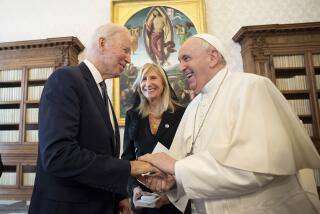With Conservative Stand on Minorsâ Rights, U.S. Irks Its Allies
UNITED NATIONS â Itâs not that the U.S. government doesnât support childrenâs rights, American diplomats say. But the Bush administration does oppose the way the U.N. wants to ensure those rights and is taking a conservative stand that is leaving even its usual friends behind.
In the run-up to next monthâs U.N. Special Session on Children, the U.S. has lined up with unusual company and against traditional allies in attempting to roll back earlier international agreements on minorsâ rights and access to health education and services.
In final planning meetings this week ahead of the special session, which opens Sept. 19, the U.S. has joined with Sudan, Libya, Iran and Pakistan to promote what administration officials call âtraditional values.â Washington wants to be sure that the summitâs final resolution will not promote explicit sex education, or even implicitly support abortion or raising the minimum age for recruiting soldiers to 18--all concepts enshrined in previous U.N. documents.
âWe lobby as we always do for our position on these things,â said U.S. negotiator Michael Southwick. âSometimes politics and the U.N. make for strange bedfellows.â
But diplomats say the Bush administrationâs focus on the abortion issue and conservative values has shifted the summit preparations away from core issues of health and survival in a way that makes some U.S. allies resentful.
âHow can we talk about a plan of action for children that doesnât deal with sex education and information?â said Brazilian negotiator Fernando Coimbra. âTo face the challenges posed by HIV/AIDS and early pregnancy, we have to keep our children informed. To wait until theyâre over 18 is too late.â
The U.S. and Somalia are the only two members of the world body that havenât ratified the 1989 U.N. Convention on the Rights of the Child, which forms the framework of the summit resolution.
The Bush administration--like earlier U.S. administrations--argues that the treaty would supersede U.S. federal and state laws on sensitive issues. And although 80 countries are sending heads of state or government to the meeting at U.N. headquarters in New York, top U.S. officials threatened to boycott if there wasnât enough support for their position.
Although no official announcement has been made, the administration now appears likely to send Health and Human Services Secretary Tommy G. Thompson and Education Secretary Rod Paige.
âThe U.S. position on health issues and international instruments has been so combative and isolationist, weâve ended up alienating traditional friends, especially Europeans,â said a former senior U.S. official involved in the talks who requested anonymity. âTheyâre taking a much harder stance than they otherwise would have, and in a sense weâve brought this on ourselves.â
While some of the Bush administrationâs positions are consistent with previous American views--the U.S. wants to continue to recruit 17-year-olds for the military, for example--Washingtonâs about-face on other stances has left many in a spin.
âConsidering that the U.S. helped craft the same language in past documents that it is now opposing, and that abortion--and free speech--are legal in the United States, this hard-line stance is a bit surprising,â said Francoise Girard, program director for the International Womenâs Health Coalition.
One of the main conflicts is over language. In the summitâs final resolution, the U.S. wants to replace the term âreproductive health servicesâ with âreproductive health care.â
In the semantic arcana of the United Nations, terms are left deliberately ambiguous to allow each country to interpret decisions and documents. But in a June meeting, a Canadian negotiator defined âservicesâ to include abortion.
A week later, the State Department sent cables to every U.S. Embassy in Latin America instructing diplomats to lobby host governments to back U.S. efforts to remove the wording. It was accompanied by a set of âtalking points,â which said that the U.S. would not send high-level participants to the conference without support for its position.
Latin American diplomats have complained that between the lines was the threat to cut off aid, a charge U.S. officials deny.
The U.S. also wants to remove a clause providing special rehabilitation for girls who are war victims, fearing this could include birth control or abortion counseling for rape.
And though many Latin American countries oppose abortion, a number of them depart from the U.S. on other issues Washington is pushing, including limiting information on reproductive health, teaching abstinence as the sole form of preventing premarital pregnancy, and moving away from the Convention on the Rights of the Child.
That leaves the U.S. aligned with conservative Islamic countries and the Vatican against the European Union, the British Commonwealth, Scandinavia, many African nations--and clearly on the defensive, negotiators said Thursday.
The preparatory committee was supposed to agree on a draft declaration by today, but talks will probably continue throughout next week.
âWe are willing to work on language that will keep the U.S. on board,â Brazilian negotiator Coimbra said.
More to Read
Sign up for Essential California
The most important California stories and recommendations in your inbox every morning.
You may occasionally receive promotional content from the Los Angeles Times.










